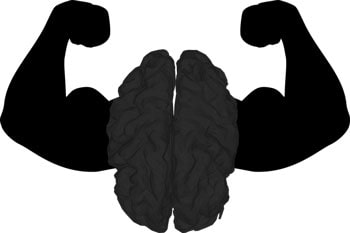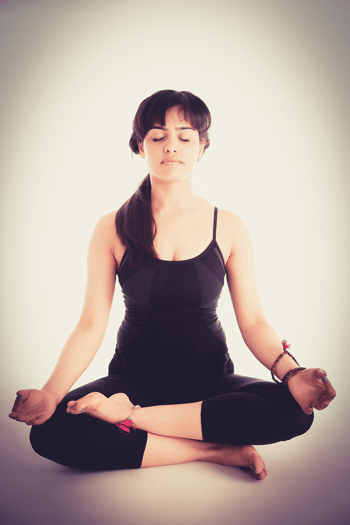The mind is a powerful thing. There’s no doubt about it.
We can’t do anything without it. We can’t reason through a problem, lace up our shoes, or pay for our Starbucks half-caff sugar-free vanilla latte. (The horror!)

But when it comes to your physical fitness and performance, how much of it is in your head?
We’ve talked before about the mental health benefits of physical exercise, but does that relationship work both ways? Are their physical benefits that stem from a healthy mind?
That’s a lot of questions, so let’s see what the experts have to say…
A group of researchers at the University of Pennsylvania are looking at things from this perspective to see if being mentally strong can help you reach your fitness goals.
In particular, they are hoping to understand why some people have an easier time meeting their fitness and health goals by studying their brains.
There are a lot of ways to be tough that don’t have anything to do with sore muscles. Being mentally focused and driven is a key component to accomplishing any task, big or small.
Just ask people like Mark Zuckerberg, Kylie Jenner, or Oprah Winfrey. They’ve all got multi-million (or billion) dollar businesses that were born of their determination to build a product, promote, and help their empire grow.
(And yes, I threw Kylie in there. Because even though she’s the youngest, she’s also the wealthiest of the Kardashian clan due to her wildly successful make-up line. Hard to believe, isn’t it?)

Yoona Kang, lead author on this study performed at the Communications Neuroscience Lab at the Annenberg School, describes mental focus as having a strong sense of purpose in life. She believes that individuals with a strong sense of life purpose are more likely to accept and act on information promoting healthy behavior.
To take it a step further, Kang thinks this is because those people have less conflict when it comes to accepting health advice. They are more confident in their decision making and more likely to follow their own minds.
As Kang explains, “health decisions, even those as simple and mundane as choosing between the elevator and the stairs, involve some decisional conflict. But what if some people experience less conflict because they have a stronger guiding purpose that helps resolve the conflicts?”
For us regular folks, an example of this type of no-nonsense decision making might be to stop making excuses and just floss our teeth. Every. Single. Night.
To test the theory that “making health decisions might take less effort for those with a higher sense of self purpose”, researchers started with a group of people that needed to exercise more.

Individuals who participated in the study were overweight or obese, and had done less than 200 minutes of physical activity in the seven days before the test. Each person in the study completed a survey asking them to agree or disagree with statements about their life purpose. For instance, “I have a sense of purpose in my life” or “I don’t have a good sense of what it is I am trying to accomplish in life.”
After the survey, each individual was shown messages promoting physical activity while their brains were monitored by an fMRI machine. Researchers focused on the areas of the brain that are used when we have to make decisions, or when we feel conflicted about a choice we have to make.
The study showed that participants that had a strong sense of purpose were more likely to agree with messages regarding their health. Their MRI showed less brain activity which means they were less conflicted about agreeing with the statements.
We can see from the study that having a sense of purpose in life makes you more likely to agree with statements about physical health, but how doesn’t that translate to meeting your goals?
How would a stronger sense of purpose help you shed that stubborn last 10 pounds… finally train for the half-marathon… or choose the healthy food option when the donut is staring at you in the face?

As many of us know from experience, there is a big difference between thinking about going to the gym and actually making it happen.
This is where the lack of decisional conflict seems to play the biggest role. The killer is the time that we spend thinking about whether or not we really want to go to the gym, the time it will take, what else we can be doing with that time, how we’re going to feel afterwards, or how it will affect the rest of our day.
If you are able to simply think, “I need to go to the gym and workout”, without it being followed by all of those doubts and questions creeping in, you’re much more likely to just get up and go get your workout done.
You will be feeling confident in your decision to work out from the moment you think about it, which is powerful motivation.
The first thing you need to remember anytime you are setting goals, fitness or otherwise, is that you have to believe in yourself.
Read that again.
You have to believe in yourself!
Confidence is key when it comes to avoiding decisional conflict and trusting in your sense of purpose.
These healthy decisions become even easier when you have strong science to back it up.
For instance, you don’t need to fret about how much exercise to get when the American Heart Association already told you it’s 150 minutes of moderate activity per week.

You also already know that…
…Exercise is also a great way to manage stress and release endorphins to keep you emotionally healthy.
…That getting your exercise in is key to maintaining healthy blood pressure. This, in turn, helps fight your risk of heart attack, kidney disease, and angina, just to name a few.
…Physical activity keeps your memory sharp and can fight the mental effects of aging.
…Exercise helps you manage your weight, which goes hand-in-hand with keeping your cholesterol on track. This protects your heart and arteries from having to work overtime, putting you at risk of cardiovascular disease, atherosclerosis and other complications.
This is a very brief list of the many reasons to get up and get moving, but you get the picture.
Arming yourself with information will help you feel more confident in your decisions to lead a healthy lifestyle.
Sources:
Purpose in life and conflict-related neural responses during health decision-making. Kang, Yoona,Strecher, Victor J.,Kim, Eric,Falk, Emily B.; June 2019
For people with strong life purpose, making healthier choices may take less effort. University of Pennsylvania; 2019
American Heart Association Recommendations for Physical Activity in Adults and Kids. American Heart Association; 2018